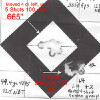Howdy
I will chime in too. I had cataract surgery in January and February of 2020, just before the Pandemic kicked in.
I was born incredibly nearsighted, wore glasses with lenses as thick as the bottom of coke bottles since I was six years old.
My cataracts had been progressing slowly for years. I see an eye doc regularly every year. Last year he told me that my cataracts had advanced enough that I should consider the surgery. For the record, he told me that the average age for men to get cataract surgery is 73.
The surgery was a piece of cake. Since my correction was so strong the surgeon recommended having the surgery for both eyes two weeks apart, so I would not be wandering around with one corrected eye and one uncorrected eye for too long. Luckily, I just got in for my second surgery just before the Pandemic hit, so I did not have to wait a long time for my second eye. Others were not so lucky, my surgeon told me she had one patient who had to wait months between eyes.
When we are young, the lens in our eyes changes shape so we can focus at different distances. We lose that ability over time. There are options today, expensive options, for lenses that can have different focal distances, but these are expensive options. Without going that route, I was given three options for lenses, close vision, middle distance, or far distance. Some folks choose to have one eye for close up for reading, the other for distance vision. A friend chose to have both eyes set for close (reading) distance and has never been happy with that. I decided to have both eyes set for distance vision. Basically everything beyond about 20 feet is in focus, I need reading glasses for reading.
My insurance picked up everything except about $200 for both surgeries. If I had chosen the more expensive variable focal distance lenses that would have been out of pocket.
Lots of eyedrops after the surgery, two different types, I forget exactly what they were each for, but I put them in less and less often as time progresses. I think I was using the drops for a few weeks, they overlapped from one eye to the next. My surgeon recommended no swimming, no open eyes in the shower for one month for each eye. I specifically asked her about the recoil of a 12 gauge shotgun, she must have thought they kick like a mule (they don't) so no shooting for a month.
Before the surgery I was subjected to a battery of tests to check my retina and my optic nerve, and to measure the inside of my eye. That allowed the surgeon to calculate exactly which lens to choose for me.
After surgery the vision in my right eye is 20/20, my left is about 20/25 or so. My cataracts were not so advanced that I noticed a huge difference in perceived colors. I have worn glasses all my life, and I found that I did not much like walking around with the wind in my eyes and nothing to stop it, so I am now wearing my old frames with new lenses. A 2 1/2 diopter correction for reading, no distance prescription for distance in the right lens, just a tiny amount in the left. I have been wearing progressive bifocals for many years, so I was quite used to them with my new lenses.
After my surgery I was a little bit over optimistic. I thought I would be able to count the individual needles on a pine tree from hundreds of feet away. Nope, I still cannot see like an eagle, but I can see pretty darn good.
About six months after the surgery I noticed halos around oncoming headlights while driving after dark. This is common. The bag, or capsule that contains the lens sometimes becomes cloudy after cataract surgery. It was worse in my left eye than my right. I had laser capsulotomy done in my left eye. It helped a little bit, but I still see some halos around lights at night with my left eye. We decided to leave well enough alone with my right eye.
One other thing. With my new corrected vision in my right eye, I can no longer focus on the front sight of a shot gun when shooting Trap. Please, no comments about focusing on the front sight. So for shooting Trap, I use an inexpensive pair of readers that have a correction of 1/2 diopter. This brings the bead of my front sight into slightly better focus without making the target too fuzzy. I will probably have a special set of shooting glasses made up with that prescription.
All in all, except for some slight difficulty driving at night, my cataract surgery was a great success.

 Not quite 1/2 moa, but it'll do
Not quite 1/2 moa, but it'll do

